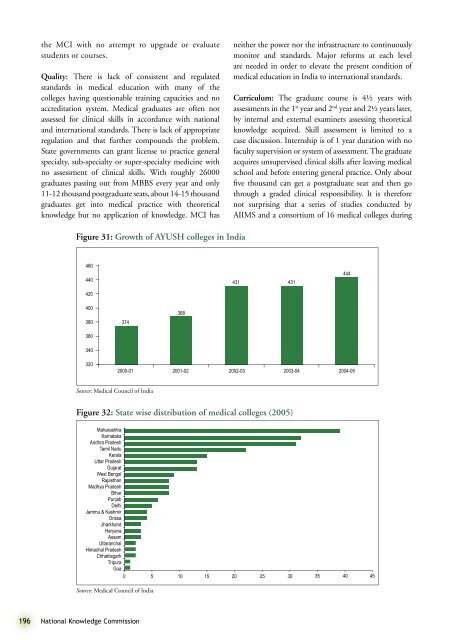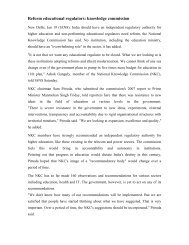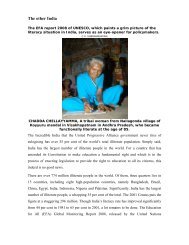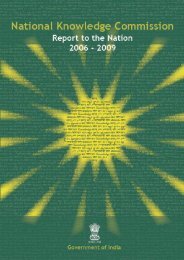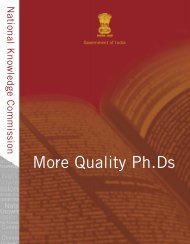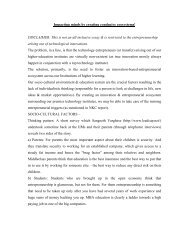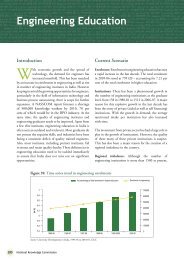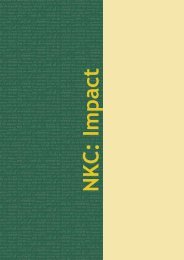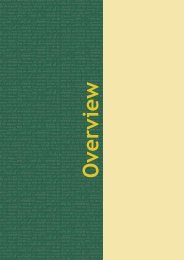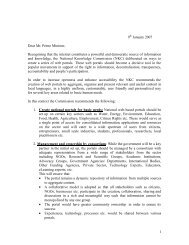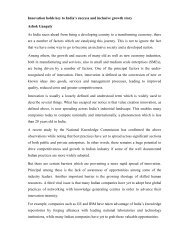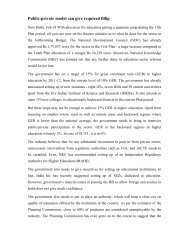National Knowledge Commission Report to the Nation 2009: Baseline
National Knowledge Commission Report to the Nation 2009: Baseline
National Knowledge Commission Report to the Nation 2009: Baseline
You also want an ePaper? Increase the reach of your titles
YUMPU automatically turns print PDFs into web optimized ePapers that Google loves.
<strong>the</strong> MCI with no attempt <strong>to</strong> upgrade or evaluatestudents or courses.Quality: There is lack of consistent and regulatedstandards in medical education with many of <strong>the</strong>colleges having questionable training capacities and noaccreditation system. Medical graduates are often notassessed for clinical skills in accordance with nationaland international standards. There is lack of appropriateregulation and that fur<strong>the</strong>r compounds <strong>the</strong> problem.State governments can grant license <strong>to</strong> practice generalspecialty, sub-specialty or super-specialty medicine withno assessment of clinical skills. With roughly 26000graduates passing out from MBBS every year and only11-12 thousand postgraduate seats, about 14-15 thousandgraduates get in<strong>to</strong> medical practice with <strong>the</strong>oreticalknowledge but no application of knowledge. MCI hasnei<strong>the</strong>r <strong>the</strong> power nor <strong>the</strong> infrastructure <strong>to</strong> continuouslymoni<strong>to</strong>r and standards. Major reforms at each levelare needed in order <strong>to</strong> elevate <strong>the</strong> present condition ofmedical education in India <strong>to</strong> international standards.Curriculum: The graduate course is 4½ years withassessments in <strong>the</strong> 1 st year and 2 nd year and 2½ years later,by internal and external examiners assessing <strong>the</strong>oreticalknowledge acquired. Skill assessment is limited <strong>to</strong> acase discussion. Internship is of 1 year duration with nofaculty supervision or system of assessment. The graduateacquires unsupervised clinical skills after leaving medicalschool and before entering general practice. Only aboutfive thousand can get a postgraduate seat and <strong>the</strong>n gothrough a graded clinical responsibility. It is <strong>the</strong>reforenot surprising that a series of studies conducted byAIIMS and a consortium of 16 medical colleges duringFigure 31: Growth of AYUSH colleges in India460440420431 4314444003803603743883403202000-01 2001-02 2002-03 2003-04 2004-05Source: Medical Council of IndiaFigure 32: State wise distribution of medical colleges (2005)MaharashtraKarnatakaAndhra PradeshTamil NaduKeralaUttar PradeshGujaratWest BengalRajasthanMadhya PradeshBiharPunjabDelhiJammu & KashmirOrissaJharkhandHaryanaAssamUttaranchalHimachal PradeshChhattisgarhTripuraGoa0 5 10 15 20 25 30 35 40 45Source: Medical Council of India196 <strong><strong>Nation</strong>al</strong> <strong>Knowledge</strong> <strong>Commission</strong>


